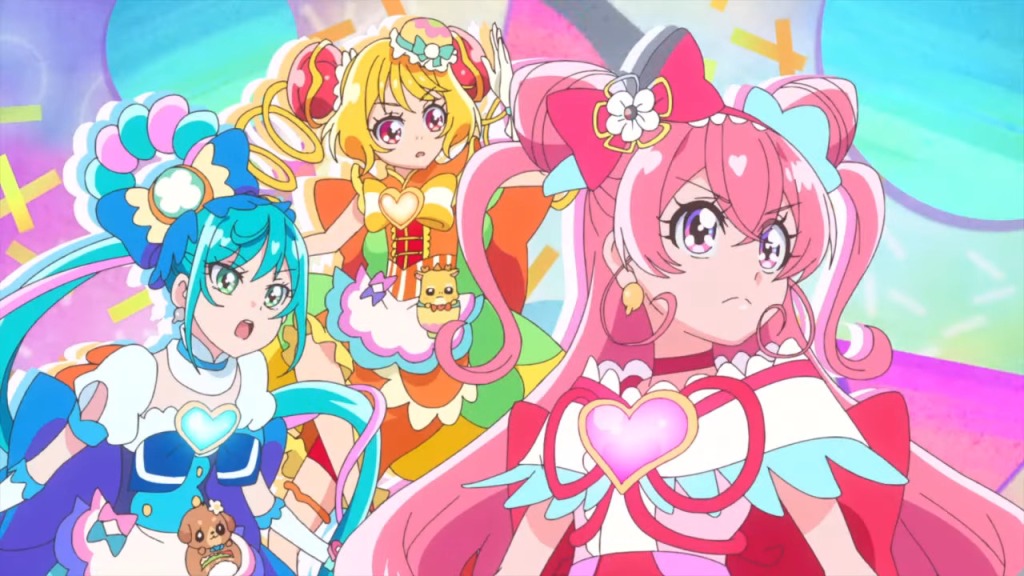
As someone who loves to eat (and seeing characters who love to eat), it was all but inevitable that I would enjoy Delicious Party Precure. But my appreciation goes beyond nailing its general food motif, as the series also successfully balances a number of different elements to make a fun and thrilling show. Whether it’s revisiting established tropes of the Precure franchise, reviving old ideas from magical girl anime of years past, or taking steps towards inclusivity, Delicious Party Precure is a pleasure to watch.
Sometimes, Precure series don’t fully commit to theming, which makes for incongruous mishmashes of various marketable elements. This issue largely does not apply to Delicious Party Precure. Its characters, from main heroines to supporting cast, are all about enjoying and cherishing food. Its story is about magical girls fighting food thieves who are literally trying to steal tastiness in the form of food spirits. Every episode watched while hungry is basically torture, as it makes every dish look like the best thing ever. The adorable mascots are food fairies from the CooKingdom, each of whom are based on a particular carb—there’s nothing quite like a chubby little ramen dragon who shouts, “Wontooon!” during transformation sequences.
That said, the series has a sub-theme if wearing makeup that’s carried over from Tropical-Rouge Precure, but it kind of falls flat here. There’s one aspect of Delicious Party that makes it work to some extent (more on that below), but even the show itself emphasizes it less and less over time.
Characterization here isn’t as deep or profound as Heartcatch Precure! or Hugtto! Precure, but it’s still quite good and never drags the show down. The basic idea of them all having different loving relationships with food is simple, yet robust. Their different relationships with food create opportunities for joyful expression, human connection, and personal growth. One missed opportunity is that it doesn’t embrace the international food theme with a more ethnically diverse cast—despite the heroines Cure Precious, Cute Spicy, and Cure Yum Yum representing Japanese, European, and Chinese food respectively, all three are Japanese.
Delicious Party features a few tropes that would be familiar to fans of Precure and its genre progenitors, i.e. magical girls and sentai tokusatsu. There’s an eventual “sixth ranger” (in this case “fourth”). The series also revives the “Tuxedo Mask” along with an extra dash of romance—a relative rarity in Precure. But Delicious Party also pulls them off, integrating them into the overall story without ignoring their histories, making them useless, or having them hog the spotlight. These are known recipes, so to speak, given enough customization to taste pleasantly different.
Another part of the successful balancing act of Delicious Party is that it embraces both its kid appeal and its capacity for more mature messages. The series has some of the best villains ever, and much like Hugtto! Precure, they seem to provide more of a connection for parents and other grown-up viewers. Even with fairly sparse moments of characterization, you get a strong sense of who they are and why they turned to the dark side. Their concerns feel more adult, highlighted by the contrast between the Precures’ youthful enthusiasm and the bad guys’ jaded cynicism.
The team shot at the end of group transformation scenes encapsulates that older-younger dual appeal. Right after a collection of exciting and silly poses mimicking the shape of riceballs, sandwiches, and noodles, it finishes with a basic arms-on-waist stance viewed head on. The switch from dynamic and playful to very direct and straightforward gives what I think is broad appeal. Truly, this is a show for all ages.
One area in which Delicious Party Precure deserves praise is the steps it takes towards inclusivity. Building off of Kira Kira Precure a la Mode’s romantic tension between two girls and Hugtto! Precure’s (unvoiced but heavily, heavily implied) gay male relationship, this series introduces Rosemary, a CooKingdom “Cook Fighter”/mentor for the Precure who is clearly trans or nonbinary. While the show is never specific, it slso goes out of its way to never gender them, and other characters don’t question Rosemary’s appearance or behavior—not even the villains! There are some hints that Rosemary has struggled with gender identity, and this is the one area where the makeup sub-theme has any legs.
The heroines all admire Rosemary’s strength, wisdom, beauty, and heart—and in a time when trans people are unjustly labeled as predators, I think this is no small thing. I find it notable that as the author of one of the biggest fantasy series in history continues to descend into trans bigotry, that Precure progresses slowly but surely.
While Delicious Party Precure has its fair share of mostly self-contained episodes, the general food emphasis always makes them a pleasant experience. And when they tap into the larger plot being woven over the long term, they help to build towards a satisfying finish. While it doesn’t quite hit the tippity-top of my Precure rankings, I can find very few glaring flaws. It was one of the highlights of watching anime every week, and the overall story is full of mental and emotional goodness—providing a balanced media diet.